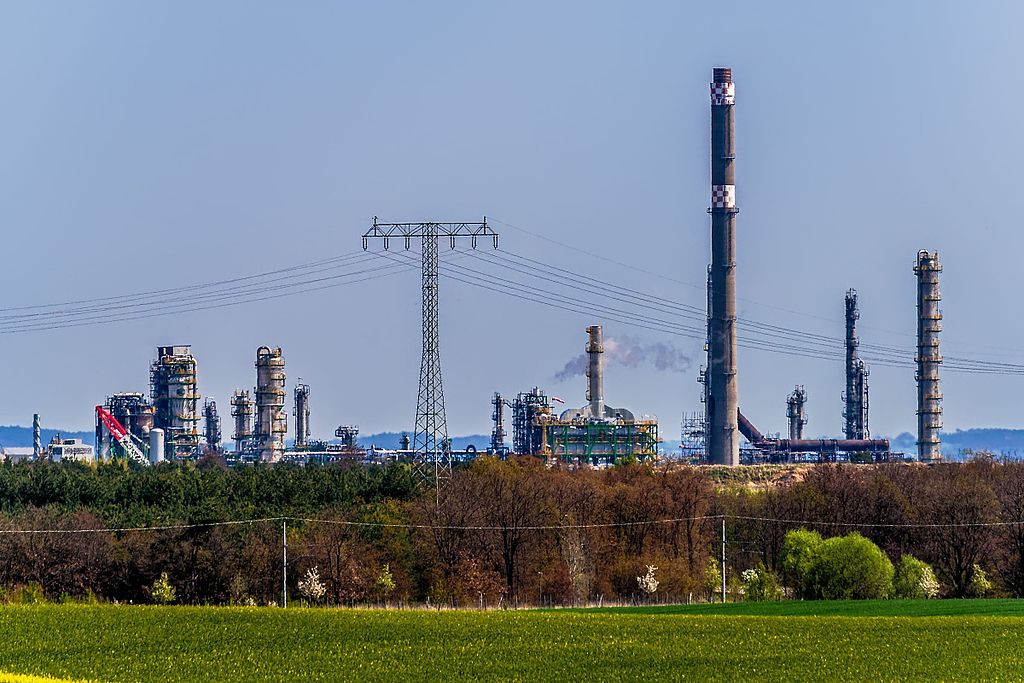The Schwedt refinery in Brandenburg supplies fuel to the north-east. With a planned oil embargo against Russia, the city fears economic repercussions and therefore brings back memories of the turmoil after reunification. The minister is furious.
“Druzhba” – Russian for “mateship” – is the name of one of the longest oil pipelines in the world, which transports Russian oil from Siberia to the refinery in Schwedt in eastern Brandenburg. Its name evokes memories of a bygone era of German-Russian relations that crumbled after the Russian invasion of Ukraine. “Putin has trampled on them,” says SPD politician Mike Bischoff as he prepares to address the citizens of the old town this morning.
Bischoff sits for Uckermark in the Brandenburg state parliament and is regarded as someone who takes citizen’s work seriously. But the Social Democrats also have a hard time: a cyclist rides by and whispers the word “warmonger” to Bischoff. In Schwedt, a town of 30,000 inhabitants on the border with Poland, world politics dominate many discussions these days.

Image: Uckermaerker, CC BY-SA 4.0, via Wikimedia Commons
Citizens in Schwedt fear for their jobs
Since the German government approved the European Union’s embargo against Russian oil, people here are worried about the future. The industrial location is dependent on Russian crude oil. The huge oil refinery on the outskirts of the city processes the oil. The refinery is also majority-owned by the Russian state-owned company Rosneft. About 1,200 people work at PHC, Petrochemical Plant. Many supplier companies also employ hundreds of people.
“PCK is Schwedt’s DNA,” say locals. Almost all of them have relatives who work at the factory, and they themselves have worked or studied there. Many citizens now fear that the planned import ban will lead to a wave of layoffs. At the same time, their fears show how difficult a cancellation can be, which, according to Vice-Chancellor Robert Habek (Greens), everyone has to accept because of the war.
The mayor wants more time before the embargo
The oil embargo does not only affect Schwedt: the plant supplies both western Poland and north-eastern Germany with petrol, diesel fuel and paraffin. That’s what politicians in the region say. According to Brandenburg’s Minister of Economics, Jörg Steinbach (SPD), without the “CPK” there would largely be standstill. Mayor Annekathrin Hoppe (non-party) agrees. From her window in the town hall she can see the refinery’s chimneys rising into the sky, a steady ball of fire burning above the refinery.
She has denounced the “terrible war”, says Hoppe. But she doubts that the effects of the embargo can be mitigated in the short term. Hoppe needs more time. She criticises the six-month transition period envisaged in the EU plans. The Federal Ministry of Economics is trying to remedy the situation. Earlier this week, State Secretary Michael Kellner (Greens) visited Schwedt. “We will do our best to keep the lights on in Schwedt,” he said.
Oil from other countries could also come to Schwedt via the ports of Gdansk and Rostock in the future. Losses in the switch from refining to processing other types of oil, for example, must be compensated at the expense of the reserves. That is the government’s plan.
Refinery in Schwedt 54 percent owned by Russia
From their point of view, a more pressing problem: Rosneft owns 54% of the shares in PSK and is unlikely to be interested in giving up its business model. Therefore, expropriation is also a possibility. PCK is keeping a low profile and leaving the question unanswered. It is difficult to talk to employees. According to an employee of a supplier who is well connected to Schwedt, the company asks its employees not to speak out in public.
Guests at an evening event in a multi-generation house in Schwedt have similar concerns. The guest is Carsten Schneider (SPD), Federal Government Plenipotentiary for the GDR. The hall is full, with filter coffee and sandwiches, it must really be about the problems of structural change. But the dominant topic is the oil embargo. Schneider tries to calm his anger.
Habeck meets resistance in Schwedt
“I myself come from Erfurt. I know what mass unemployment is,” he says. “So do we,” someone in the audience immediately replies. That sets the tone for the discussion. Someone finds it outrageous that Habek makes terse calls for “saving money” while travelling abroad in Qatar. The political style of new honesty praised by Habek, however, seems to be perceived as unrealistic by Schwedt. Similar tones also come from the business side.
“In the case of PCK, we see enormous half-knowledge and ignorance,” says Jörn Klitzing from the East Brandenburg Chamber of Industry and Commerce. “I expect humility so that there is not so much unrest in the region. That we have real problems has to be seen in politics.”
In general, many question the sense of the import ban: “The embargo will not shorten the war. I am overwhelmed by this discussion,” said the former PCK employee to a standing ovation from the audience. In general, the German government’s course in Ukraine was perceived critically by many present. There are warnings of “warmongering” before the “escalation spiral”.
Also a warning against interrupting the thread of conversation about Russia: “We must not destroy bridges to Russia”. Why not just ask Putin: “What do you really want?” That is a serious proposal to which there is no objection.
So does Schwedt exemplarily show the limits of renunciation? “In any case, this discussion reflects the opinion of the majority in Schwedt,” said André Nicke, artistic director of the Uckermärkische Bühnen in Schwedt, after the event. Until recently, the copper-red façade of the theatre, reminiscent of the Palace of the Republic, was illuminated by the yellow and blue national colours of Ukraine.
Since it was clear that an embargo was imminent, that was the end of it. “A sign of what it’s like when the lights go out in Schwedt,” says Nicke. Then solidarity can be like Russian oil for Ukraine: It, too, is finite.
